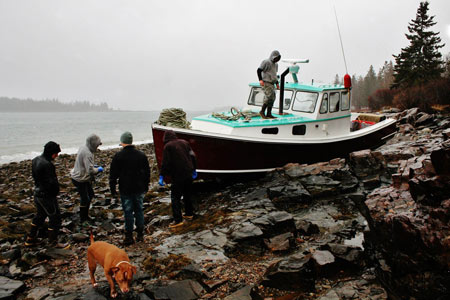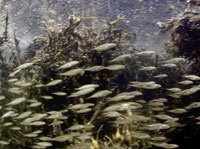
The good lobster fishing in Maine has the boatyards busy again. Lobster markets have kept prices from sagging so far this year. Scientists’ understanding of fisheries science is evolving alongside the evolving global climate. Water temperature is edging out ocean acidity as a key factor in fish behavior. It is also driving extremes in coastal weather events, currents and habitat. ©Joel Woods photo
Lobstermen, Crab &
Fin Fishermen Shut Out
of Georges
by Mike Crowe
In what the New England fishing industry is calling an end run around the due process of law, nearly 5,000 square miles of ocean off Cape Cod, Mass., are being closed to lobster, finfish and red crab fishing. The New England Fishery Management Council (NEFMC) had been working on a habitat management plan in the same area. “The more open, transparent process within NEFMC was trumped by the well-funded, politically connected lobbyists from environmental non-governmental organizations (ENGOs), which pushed their agenda at the executive level,” said offshore lobsterman David Borden.
These ENGOs, charge critics, promoted the use of the Antiquities Act of 1906 to achieve their goals outside of the view of the fishing industry and public. That act was established in the administration of President Theodore Roosevelt to move forward by executive order the protection of Native American artifacts, at a time when they were being swept up in large numbers to be placed on open artifacts markets worldwide. The Antiquities Act was also used to set aside the Grand Canyon, recognizing the importance and value of the nation’s greatest common resources.
The use of the Antiquities Act in the recent Northeast Canyons and Seamounts Marine National Monument case does not recognize either Native American antiquities or anything in the water column. However, it does carry the authority of the executive office over what is on and under the bottom.
Borden—a Rhode Island offshore lobsterman, executive director of the Atlantic Offshore Lobstermen’s Association, and chairman of the Lobster Board of the Atlantic States Marine Fisheries Commission (ASMFC)—said, “There is a process in place through the NEFMC and the ASMFC and this could have been done through these agencies, but the ENGOs circumvented those public processes by using the Antiquities Act. The ENGOs have wanted areas closed to fishing for a long time and they found a way around due process.”






